初二英语的知识点大全:易错词汇归纳
八年级上册总复习易错点

八年级上册总复习易错点1.be + 形容词+to do sth. 表示做某事…2.one…the other …一个…另一个…表示两者中的一个另一个3.表建议的:let’s + 动词原形;why not +v.原形; why don’t you + v.原形;what about \howabout + v.ing4.send sth. To sb. =send sb.sth.寄给某人某物lend sth.to sb.=lend sb.sth.借给某人某物bring sth.to sb.=bring sb.sth.给某人带来某物post\mail sth. To sb.给某人邮寄某物show sth.tosb.=show sb.sth. 给某人展示某物pass sth.to sb.\pass sb.sth.给某人传某物give5.play+乐器必须加the ;play+球类什么都不加6.write down 名词放在down 之后.如:write down your names+代词,放在之间如:write it down或write them down 所有动词+介词构成的短语用法都是一样7.both 两者都;all 三者或三折以上都8.feel\taste\smell\sound\look+形容词9.be kind\good\nice\friendly to sb.对…好10.be patient \ strict with sb. ;be hard on…对…严厉.对…苛刻11.on 在…的上面;或是…的成员12.have the pleasure of doing…=be happy to do sth.=be glad to do sth. =have fun doing sth.高兴做某事13.one of +名词复数…之一one of 短语作主语是谓语动词用三单14.肯定句用something\some body等;否定句或疑问句用anything\anybody等不定代词的修饰语放在不定代词]之后15.except 除了…之外16.it is +形容词+to do ath.17.it takes \took +时间+to do sth.做某事花费多长时间spend 花费spend in doing\spend on …主语是人cost 花费主语是物pay 付钱主语是人pay for…18.for +时间表一段时间常用现在完成时;对其提问用:how longin +时间表示多长时间之后常用将来时对其提问用:how soonhow far 问距离how many _可数名词复数问数量how much +不可数名词问多少;还问价钱19.表时间的介词on+某一天或某天的上午\下午\晚上; in+年\月=季节或in themorning;in the afternoon ;in the evening; at +时间点20.maybe 句首合,句中分21.see sb.do sth. 看见某人做某事(强调习惯性动作);see sb. Doing sth.看见某人正在做某事类似的词还有watch hear feel,notice等22.+ed 修饰人;+ing 修饰物d 被叫做=called 如I have a good friend named Du Renkaidi .24.A seven-day holiday 一个七天的假期复合形容词---中的名词不用加s.25.thanks for…因…谢谢你thanks to 多亏了…give thanks to sb. For sth. 因为…谢谢某人26.店员:what can Ido for you? \May I help you /\canI help you ?顾客;I want to buy …\I am looking for …27.It is time to do sth。
八年级易错知识点英语
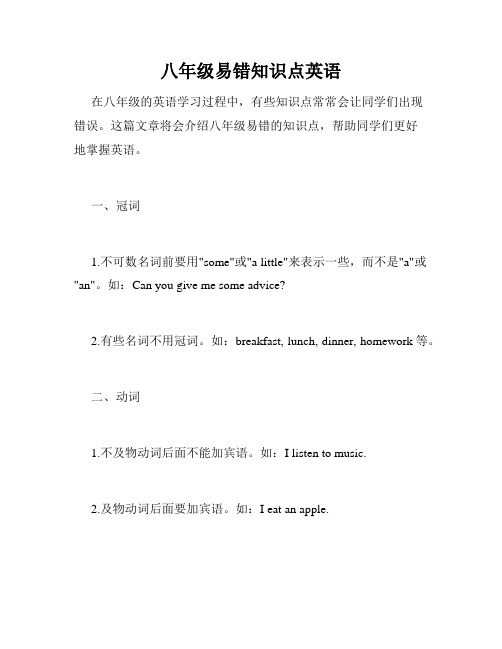
八年级易错知识点英语在八年级的英语学习过程中,有些知识点常常会让同学们出现错误。
这篇文章将会介绍八年级易错的知识点,帮助同学们更好地掌握英语。
一、冠词1.不可数名词前要用"some"或"a little"来表示一些,而不是"a"或"an"。
如:Can you give me some advice?2.有些名词不用冠词。
如:breakfast, lunch, dinner, homework等。
二、动词1.不及物动词后面不能加宾语。
如:I listen to music.2.及物动词后面要加宾语。
如:I eat an apple.3.一些动词有自己的固定搭配,需要记住。
如:make a mistake, take a walk等。
三、形容词和副词1.形容词一般在名词前面,副词一般在动词后面。
如:She is a beautiful girl. He walks slowly.2.形容词和副词有比较级和最高级,需要注意用法。
如:She is taller than me. He is the tallest boy in the class.四、时态1.一般现在时表示现在的状态或动作。
如:I go to school every day.2.现在进行时表示正在进行的动作。
如:I am watching TV now.3.一般过去时表示过去某个时间的状态或动作。
如:I went to the cinema yesterday.4.过去进行时表示过去正在进行的动作。
如:I was watching TV at 8 o'clock last night.5.将来时表示将来要发生的事情。
如:I will go to Beijing next week.五、名词1.名词有单数形式和复数形式,需要记住。
如:book-books, child-children等。
八年级英语上册易错知识点
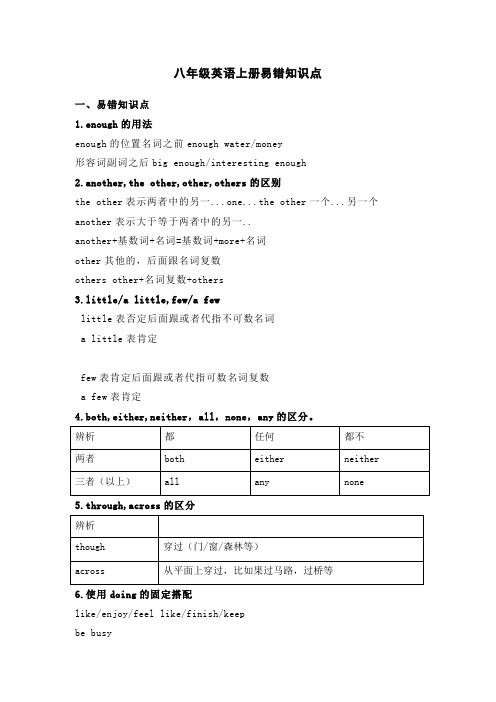
八年级英语上册易错知识点一、易错知识点1.enough的用法enough的位置名词之前enough water/money形容词副词之后big enough/interesting enough2.another,the other,other,others的区别the other表示两者中的另一...one...the other一个...另一个another表示大于等于两者中的另一..another+基数词+名词=基数词+more+名词other其他的,后面跟名词复数others other+名词复数+others3.little/a little,few/a fewlittle表否定后面跟或者代指不可数名词a little表肯定few表肯定后面跟或者代指可数名词复数a few表肯定4.both,either,neither,all,none,any的区分。
5.through,across的区分6.使用doing的固定搭配like/enjoy/feel like/finish/keepbe busybe used to/look forward to+doing介词后7.使用do的固定搭配情态动词had betterdo/does/diddon’t/doesn’t/didn’t+domake/let sb8.形容词副词的位置形容词①修饰名词或者代词,作定语;(注意;名词之前,复合不定代词之后)an interesting novel;something important.②在系动词之后,作表语(系动词包括感官动词,be动词以及一些半动词)Smell good/keep healthy/seem unhappy③在宾语之后,作宾语补主语。
find/make/believe+宾语+形容词副词①修饰形容词/副词(一般在形容词副词前)She is really talented in skiing.②修饰动词(在be动词/情态动词之后,实义动词之前)He can also finish the match.I often go swimming once a week.③修饰句子Luckily,he didn’t hurt himself badly.9.形容词副词原级,比较级和最高级的区分以及同义句转换、原级比较结构:①A+谓语动词+as+adj/adj.原形+as+B②A+谓语动词(否定)+so/as+adj/adj.原形+as+B比较级结构:①A+谓语动词+adj/adj.比较级than+B②much/far/even/a lot等修饰比较级③比较级+and+比较级④The+比较级(+主谓),the+比较级(+主谓).越...就越...⑤Which+谓语动词+比较级,A or B?最高级结构①one of+the+形容词最高级+名词复数②The+序数词+最高级③Which+谓语动词+最高级,A、B or C?④形容词最高级前必须加the.同义句转换①She is not as tall as Lily.=she is shorter than Lily=Lily is taller than she/her.②She is the best student in her class=She is better than any other student in her class=She is better than the other students in her class10.感叹句what/how的结构辨别What a/an+形容词+可数名词的单数(+主语+谓语)!What+形容词+不可数名词/可数名词的复数(+主语+谓语)!How+形容词+a/an+可数名词的单数(+主语+谓语)!How+形容词/副词原形(+主语+谓语)!How+主语+谓语!11.So/such...that结构辨别so++形容词+a/an+可数名词的单数+that+句子so++形容词/副词原形+that+句子so++many/much/little/few+可数名词的复数/不可数名词+that+句子such++a/an+形容词+可数名词的单数+that+句子such++除many/much/little/few外的形容词+可数名词的复数/不可数名词+that+句子12.There be结构与used to do的结合There be there used be这儿过去有/是...used to do13.There be结构与一般将来时饿结合There bewill do there will be这儿将会有/是...There bebe going to do there is/are going to be这儿将会有/是...14.主将从现的用法主句用一般将来时,从句用一般现在时适用这一用法的连接词:if如果,unless如果不;除非;when当..时候;as soon as一...就as long as只要(连词引导的句子叫从句)If it doesn’t rain tomorrow,we will go out to ride bikes.注意:若if的意思为是否时,那么时态就不是主将从现,而是根据时间状语来判断。
初中英语易错词汇

初中英语易错词汇1.affect 和effect:常被误用。
affect是动词,意为“影响”;effect是名词,意为“效果”或“影响”。
2.advice 和advise:advice是名词,意为“建议”;advise是动词,意为“建议”。
3.between 和among:between用于两者之间,among用于三者或三者以上之间。
4.borrow 和lend:borrow意为“借入”,lend意为“借出”。
5.bring 和take:bring意为“带来”,take意为“带走”。
6.can 和may:can表示能力或可能性,may表示许可或可能。
7.few 和little:few修饰可数名词,little修饰不可数名词。
8.healthy 和healthily:healthy是形容词,healthily是副词。
9.its 和it's:its是形容词性物主代词,it's是it is的缩写。
10.know 和knew:know是现在时,knew是过去时。
11.lie 和lay:lie是不及物动词,意为“躺”;lay是及物动词,意为“放置”。
12.lose 和miss:lose意为“丢失”,miss意为“想念”或“错过”。
13.noise 和voice:noise是噪音,voice是人的声音。
14.pass 和past:pass是动词,past是介词或副词。
15.problem 和question:problem指需要解决的问题,question指问题或疑问。
16.quiet 和quite:quiet是形容词,意为“安静的”;quite是副词,意为“非常”。
17.receive 和accept:receive指收到,accept指接受。
18.say 和speak:say强调说话内容,speak强调说话动作。
19.since 和for:since与时间点连用,for与时间段连用。
20.some time 和sometime:some time表示一段时间,sometime表示某个时候。
八年级英语易错点
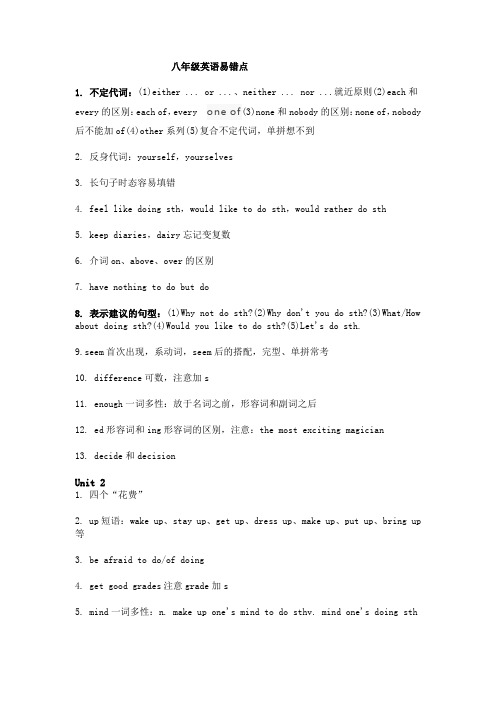
八年级英语易错点1. 不定代词:(1)either ... or ...、neither ... nor ...就近原则(2)each和every的区别:each of,every one of(3)none和nobody的区别:none of,nobody 后不能加of(4)other系列(5)复合不定代词,单拼想不到2. 反身代词:yourself,yourselves3. 长句子时态容易填错4. feel like doing sth,would like to do sth,would rather do sth5. keep diaries,dairy忘记变复数6. 介词on、above、over的区别7. have nothing to do but do8. 表示建议的句型:(1)Why not do sth?(2)Why don't you do sth?(3)What/How about doing sth?(4)Would you like to do sth?(5)Let's do sth.9.seem首次出现,系动词,seem后的搭配,完型、单拼常考10. difference可数,注意加s11. enough一词多性:放于名词之前,形容词和副词之后12. ed形容词和ing形容词的区别,注意:the most exciting magician13. decide和decisionUnit 21. 四个“花费”2. up短语:wake up、stay up、get up、dress up、make up、put up、bring up 等3. be afraid to do/of doing4. get good grades注意grade加s5. mind一词多性:n. make up one's mind to do sthv. mind one's doing sth6.频度副词:seldom=hardly几乎不(否定含义),almost几乎(肯定含义)7.次数、倍数:once、twice、three times8. be full of和be filled with9. result一词多性n. Here are the results of ...,result用复数as a result 和as a result of的区别v. result in=lead to10.although、though和through11. die、died、dead、dying、death 、die of12. point一词多性,point to和point at13. percent不加s14. the Internet,定冠词the,首字母I大写15. swing一词多性,单拼常考16. however完型填空常考17. magazine单拼加s18. 积累谚语Unit 3& Unit 4一、语法部分:形容词&副词比较级和最高级1、变化规则和不规则变化:注意重读闭音节和多音节;不规则变化2、用法:比较级注意加the的用法和修饰比较级的词;原级注意as...as这个结构和其否定形式最高级注意三个结构的用法3、倍数表达法4、最高级后接of/ in的用法二、句型结构1、It’s +adj./ adv. +for / of sb to do sth 注意for 和of 的选择2、As long as/ as soon as / if / when的意思和主从句的时态三、单词1、truly注意单词拼写2、care for/ about3、reach for4、play a role/ part in5、poor的意思6、be crowded with7、heavy 形容交通和雨雪8、be up to 取决于9、pretty作为副词10、close的词性/ closed11、see / hear/ watch sb do/ doing sth12、keep / make sth. +adj.13、keep (on) doing14、let/ make / have sb do sth15、like 两种词性,对应的反义词分别为dislike 和unlike16、serious & seriously take sth. Seriously17、综合复习职业的单词;复习第四单元的不规则动词过去式注意:一词多性的用法Unit 5 & Unit 6词汇部分:一、词根词缀梳理:1. —al education—educational physics —physical person— personal culture— cultural2. —fullesscareful/careless useful/useless hopeful/hopeless meaningful /meaningless successful3. — ousdanger — dangerous fame— famous4. —ly day— daily week —weekly month—monthly year—yearly5. —iondiscuss —discussion decide—decision resolve —resolution educate-education act — action6. —mentimprove — improvement agree —agreement disagree— disagreement7. dis-agree— disagree like —dislike appear— disappear8. un-lucky— unlucky able — unable like —unlike crowded—uncrowded9. —shiprelation- relationship friend —friendship职业:cook/driver/foreigner/visitor/ pianist/dentist/scientist/musician/magician/pilot二、易忽视(错)的点:1. cook 和 cooker2. go to the doctor/ dentist (名词用单数形式,容易误+“s”)3. promise sb. to do (❌) hope sb. to do (❌)4.be ready to do “乐意去做…” 的含义容易忽视5. appear 和 seem 作为“表象系动词” 的串联讲解(1. + to do 2. (to be) + adj. 3. It seems(ed)/appears(ed) that …)6. become / get 作为“变化系动词” 的串联讲解(1. + adj. 的相关形式 2. 用于进行时态)7. main / primary 作为“主要的” 的串联讲解,单拼容易错。
八年级上册英语易错知识点

八年级上册英语易错知识点英语是一门语言,学习起来会有许多的难点和易错点。
八年级上册英语知识点也不例外,在这篇文章中,我们就来一起讨论一下这些易错知识点。
1. 词性转换英语中有很多的词性转换,例如名词转动词、形容词转副词等,这在英语中十分重要,因为往往我们需要根据需要将一个词转变成不同的词性。
例如:- mistake(名词)→mistaken(形容词)- happy(形容词)→happily(副词)- talk(动词)→talker(名词)2. 常见动词时态和语态常用的动词时态包括一般现在时、一般过去时、现在进行时、过去进行时、一般将来时等等。
而语态则包括主动语态和被动语态。
在使用动词时态和语态时,需要了解其正确的用法,例如:- The dog(主语)was being(being为现在进行时被动语态)chased by the cat.- She has(has为现在完成时)been studying English for five years.- The cake(主语)will be(will为一般将来时被动语态)made by me.3. 句子结构英语句子的结构往往比较复杂。
最基本的是主谓宾结构,而在这个基础上,还有许多复杂句型。
例如:- If it rains, I will stay at home.(条件句)- She is not only a great singer, but also a talented writer.(并列句)- Although he is rich, he is not happy.(让步状语从句)了解不同的句型和结构,才能更好地理解和运用英语。
4. 介词的用法介词在英语中是一个非常重要的词汇,它可以用来描述时间、空间和关系。
常见的介词包括:in、on、at、under、over等等。
例如:- I will meet you at the airport.- The book is on the table.- She is in the room.5. 动词和介词的搭配动词和介词的搭配是英语中的一个重要知识点,因为不同的介词可以用来表达不同的意思,而一些动词只能搭配特定的介词。
初二英语易错知识点集锦
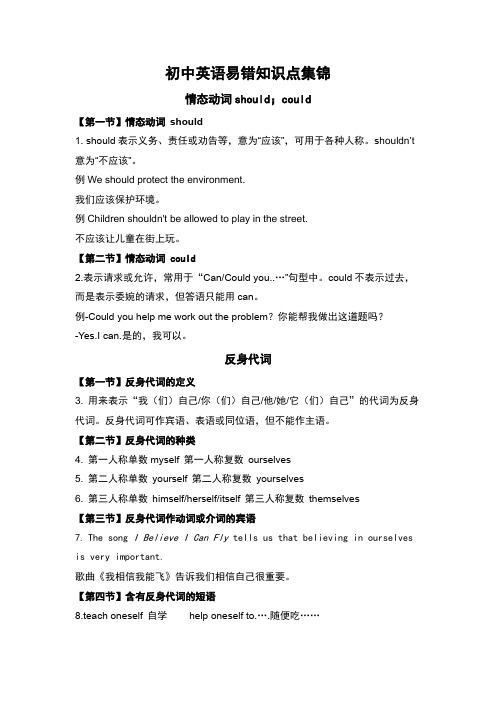
初中英语易错知识点集锦情态动词should;could【第一节】情态动词should1. should表示义务、责任或劝告等,意为“应该”,可用于各种人称。
s houldn’t 意为“不应该”。
例We should protect the environment.我们应该保护环境。
例Children shouldn't be allowed to play in the street.不应该让儿童在街上玩。
【第二节】情态动词 could2.表示请求或允许,常用于“Can/Could you..…”句型中。
could不表示过去,而是表示委婉的请求,但答语只能用can。
例-Could you help me work out the problem?你能帮我做出这道题吗?-Yes.I can.是的,我可以。
反身代词【第一节】反身代词的定义3. 用来表示“我(们)自己/你(们)自己/他/她/它(们)自己”的代词为反身代词。
反身代词可作宾语、表语或同位语,但不能作主语。
【第二节】反身代词的种类4. 第一人称单数myself 第一人称复数ourselves5. 第二人称单数yourself 第二人称复数yourselves6. 第三人称单数himself/herself/itself 第三人称复数themselves【第三节】反身代词作动词或介词的宾语7.The song I Believe I Can Fly tells us that believing in ourselves is very important.歌曲《我相信我能飞》告诉我们相信自己很重要。
【第四节】含有反身代词的短语8.teach oneself 自学help oneself to.….随便吃……dress oneself自己穿衣服lose oneself 迷失方向,迷路by oneself独自hurt oneself伤害自己enjoy oneself玩的愉快动词不定式【第一节】动词不定式的形式9.基本形式为“to+动词原形”,否定形式为“not to+动词原形”。
初二英语易错知识点集锦

初中英语易错知识点集锦(初二)情态动词should;could【第一节】情态动词should1. should表示义务、责任或劝告等,意为“应该”,可用于各种人称。
s houldn’t 意为“不应该”。
例We should protect the environment.我们应该保护环境。
例Children shouldn't be allowed to play in the street.不应该让儿童在街上玩。
【第二节】情态动词 could2.表示请求或允许,常用于“Can/Could you..…”句型中。
could不表示过去,而是表示委婉的请求,但答语只能用can。
例-Could you help me work out the problem?你能帮我做出这道题吗?-Yes.I can.是的,我可以。
反身代词【第一节】反身代词的定义3. 用来表示“我(们)自己/你(们)自己/他/她/它(们)自己”的代词为反身代词。
反身代词可作宾语、表语或同位语,但不能作主语。
【第二节】反身代词的种类4. 第一人称单数myself 第一人称复数ourselves5. 第二人称单数yourself 第二人称复数yourselves6. 第三人称单数himself/herself/itself 第三人称复数themselves【第三节】反身代词作动词或介词的宾语7.The song I Believe I Can Fly tells us that believing in ourselves is very important.歌曲《我相信我能飞》告诉我们相信自己很重要。
【第四节】含有反身代词的短语8.teach oneself 自学help oneself to.….随便吃……dress oneself自己穿衣服lose oneself 迷失方向,迷路by oneself独自hurt oneself伤害自己enjoy oneself玩的愉快动词不定式【第一节】动词不定式的形式9.基本形式为“to+动词原形”,否定形式为“not to+动词原形”。
八年级下册英语单词重点易错
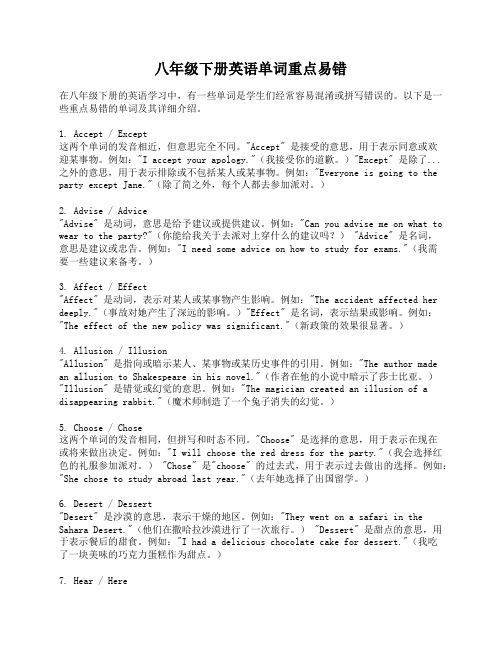
八年级下册英语单词重点易错在八年级下册的英语学习中,有一些单词是学生们经常容易混淆或拼写错误的。
以下是一些重点易错的单词及其详细介绍。
1. Accept / Except这两个单词的发音相近,但意思完全不同。
"Accept" 是接受的意思,用于表示同意或欢迎某事物。
例如:"I accept your apology."(我接受你的道歉。
)"Except" 是除了...之外的意思,用于表示排除或不包括某人或某事物。
例如:"Everyone is going to the party except Jane."(除了简之外,每个人都去参加派对。
)2. Advise / Advice"Advise" 是动词,意思是给予建议或提供建议。
例如:"Can you advise me on what to wear to the party?"(你能给我关于去派对上穿什么的建议吗?) "Advice" 是名词,意思是建议或忠告。
例如:"I need some advice on how to study for exams."(我需要一些建议来备考。
)3. Affect / Effect"Affect" 是动词,表示对某人或某事物产生影响。
例如:"The accident affected her deeply."(事故对她产生了深远的影响。
)"Effect" 是名词,表示结果或影响。
例如:"The effect of the new policy was significant."(新政策的效果很显著。
)4. Allusion / Illusion"Allusion" 是指向或暗示某人、某事物或某历史事件的引用。
英语语法八大易错点、初二英语语法知识

英语语法八大易错点[第一类] 名词类1. 这些女老师们在干什么?[误] What are the woman teachers doing?[正] What are the women teachers doing?[析] 在英语中,当一名词作定语修饰另一名词(单或复数形式)时,作定语的名词一般要用其单数形式;但当man, woman 作定语修饰可数名词复数形式时,要用其复数形式men, women.2. 房间里有多少人?[误] How many peoples are there in the room?[正] How many people are there in the room?[析] people作“人、人们”解时,是个集合名词,其单复数同形。
3. 我想为我儿子买两瓶牛奶。
[误] I want to buy two bottle of milk for my son.[正] I want to buy two bottles of milk for my son.[析] 表示不可数名词的数量时,常用“a / an或数词+表量的可数名词+ of +不可数名词”这一结构,其中当数词大于1时,表量的可数名词要用其复数形式。
[第二类] 动词类4. 你妹妹通常什么时候去上学?[误] What time does your sister usually goes to school?[正] What time does your sister usually go to school?[析] 借助助动词do(或does)构成疑问句或否定句时,句中的谓语动词用其原形。
5. 琳达晚上经常做作业,但今晚她在看电视。
[误] Linda often do her homework in the evening, but this evening she watching TV.[正] Linda often does her homework in the evening, but this evening she is watching TV.[析] 在初一英语学习阶段,我们接触到了两种主要时态:一般现在时和现在进行时。
初二英语易错词汇归纳(81-120)

初二英语易错词汇归纳(81-120)初二英语易错词汇归纳1.real,truereal真的,真实的,指的是事实上存在而不是想象的,true真的,真正的,指的是事实和实际情况相符合realgold,atruestor2.respectful,respectablerespectful尊敬,有礼貌,respectable可敬的,值得尊敬的berespectfultotheaged3.outards,outard二者均可用作副词,表示向外,外面,outard还可用作形容词anoutardvoyage4.pleasant,pleased,pleasingpleasant常用作定语,pleased,pleasing常用作表语,pleased主语常为人,pleasing主语常为物apleasanttripThetripispleasing.5.understanding,understandableunderstanding明白事理的,能体谅的,understandable 可理解的,能够懂的anunderstandinggirl,anunderstandableistae6.close,closelclose接近,靠近,closely紧紧地,紧密地closelyconnected,standclose7.ill,sicill做表语,sic定,表均可asicbo8.good,ellgood形容词,ell副词,但指身体状况是形容词Heisellagain.quiet,silent,stillquiet安静的,可以发出小的声音,silent不发出声音,但可以动,still完全不动,完全无声响Hestandtherestill.他站在那儿,一动不动,也不说话。
0.hard,hardlhard努力,hardly几乎不orhardIcanhardlybelieveit.1.able,capableable与不定式todo连用,capable与of连用Heiscapableofdoing…2.alost,nearl二者均为"几乎,差不多"和否定词连用用alostalostnobodte,latellate迟,晚,lately最近,近来Ihaven'tseenhilately.4.living,alive,live,livelliving,alive,live均为活着的,living定表均可,alive定表均可,定语后置,live只能做定语,lively意为活波的allthelivingpeople=allthepeoplealive5.excited,excitingexcited使人兴奋的,exciting令人兴奋的I'excited.Thenesisexciting.6.deep,deepldeep具体的深,deeply抽象的深,深深地deeplyoved,digdeep7.aloud,loudaloud出声地,loud大声地readaloud8.orth,orth二者均为值得,orth后接doing,orthy后接tobedone,ofbeingdoneItisorthvisiting.=It'sorthytobevisited.=It'sorthyof beingvisited.9.bad,badlbad形容词,badly副词,不好,但与need,ant,require 连用为"很,非常"gobadIneedtheboobadly.00.beforelong,longbeforebeforelong不久以后,longbefore很久以前notlongbefore=beforelong01.quite,ratherquite完全地,相当于pletely,rather修饰比较级quiteipossible02.happy,gladhappy高兴,幸福,定表均可,glad高兴,只能做表语ahappygirl03.instead,insteadofinstead是副词,放在句首或句末,insteadof是介词短语,放在句中Hedidn'tseeafil.InsteadheatchedTV.HeatchedTVinstead ofseeingafil.04.toouch,uchtootoouch后接不可数名词,uchtoo后接形容词uchtooheav05.beaboutto,begoingto,betodobeaboutto表最近的将来,后面不接时间状语,begoingto侧重打算,想法,betodo侧重意志,计划,安排I'toeethi.06.raise,riseraise及物动词,rise不及物动词Thesunrisesintheeast.07.bring,tae,carry,fetchbring拿来,tae带走,carry随身携带,fetch去回这一往返动作fetchaboxofchal08.spend,tae,pay,costspend人做主语,花钱,花时间;spend…onsth./indoingsth;tae物做主语,花时间;pay人做主语,花钱,payfor;cost物做主语,花钱09.join,joinin,taepartinjoin加入某个组织,并成为其中的一员;joinin参加小型的活动,joinsb.in;taepartin参加大型的活动Hejoinedthearyfiveyearsago.10.learn,studlearn学习,侧重学习的结果,study学习,侧重学习的过程,研究studytheproble11.ant,hope,ishant打算,想要,anttodo,antsb.todo,hope希望,hopetodo/hopethat…ish希望ishtodo,ishsb/sth.+n.Iishyousuccess.12.discover,invent,findoutdiscover发现本来存在但不为人所知的东西,invent 发明本来不存在的物体,findout发现,查明Atlasthefoundoutthetruth.13.anser,replanser及物动词,reply不及物动词,后接toreplytotheletter14.leave,leaveforleave离开,leavefor前往HeleftBeijingforShanghai.15.rob,stealrob抢劫robsb.ofsth.,steal偷stealsth.frosb.16.shoot,shootatshoot射死,shootat瞄准,但不一定射中Heshotthebirdanditdied.17.drop,falldrop及物不及物均可,fall不及物动词Pricesfell/dropped.Hedroppedhisvoice.18.search,searchforsearch后接地点,searchfor后接东西Hesearchedhispocetforoney.edto,beusedtousedto过去常常,beusedto习惯于,后接sth./doingsth.;被用来,后接dosth.Heisusedtogettingupearly.0.in,lose,beatin后接sth.,反义词为lose,beat后接sb.inthegae,beatthe。
初二英语上册易错点预习必备Unit1

初二英语上册易错点预习必备:Unit1
1. 不定代词:
(1)either ... or ...、neither ... nor ...就近原则
(2)each和every的区别:each of,every one of
(3)none和nobody的区别:none of,nobody后不能加of
(4)other系列
(5)复合不定代词,单拼想不到
2. 反身代词:yourself,yourselves
3. 长句子时态容易填错
4. feel like doing sth,would like to do sth,would rather do sth
5. keep diaries,dairy忘记变复数
6. 介词on、above、over的区别
7. have nothing to do but do
8. 表示建议的句型:
(1)Why not do sth?
(2)Why don't you do sth?
(3)What/How about doing sth?
(4)Would you like to do sth?
(5)Let's do sth.
9.seem首次出现,系动词,seem后的搭配,完型、单拼常考
10. difference可数,注意加s
11. enough一词多性:放于名词之前,形容词和副词之后
12. ed形容词和ing形容词的区别,注意:the most exciting magician
13. decide和decision。
八年级上册英语易错单词
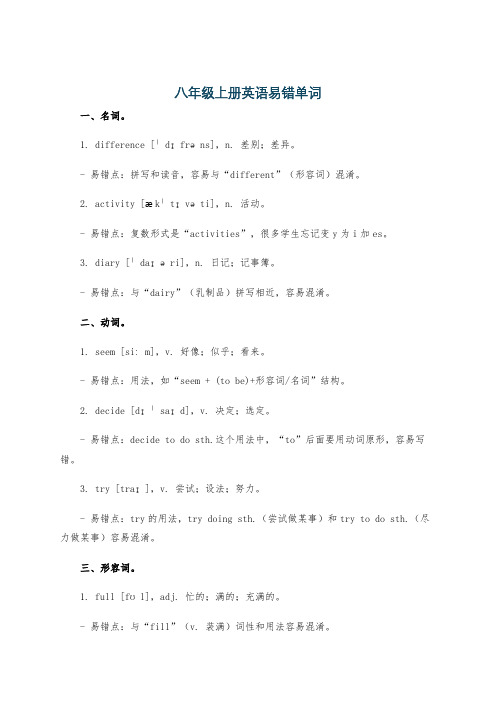
八年级上册英语易错单词一、名词。
1. difference [ˈdɪfrəns],n. 差别;差异。
- 易错点:拼写和读音,容易与“different”(形容词)混淆。
2. activity [ækˈtɪvəti],n. 活动。
- 易错点:复数形式是“activities”,很多学生忘记变y为i加es。
3. diary [ˈdaɪəri],n. 日记;记事簿。
- 易错点:与“dairy”(乳制品)拼写相近,容易混淆。
二、动词。
1. seem [siːm],v. 好像;似乎;看来。
- 易错点:用法,如“seem + (to be)+形容词/名词”结构。
2. decide [dɪˈsaɪd],v. 决定;选定。
- 易错点:decide to do sth.这个用法中,“to”后面要用动词原形,容易写错。
3. try [traɪ],v. 尝试;设法;努力。
- 易错点:try的用法,try doing sth.(尝试做某事)和try to do sth.(尽力做某事)容易混淆。
三、形容词。
1. full [fʊl],adj. 忙的;满的;充满的。
- 易错点:与“fill”(v. 装满)词性和用法容易混淆。
2. wonderful [ˈwʌndəfl],adj. 精彩的;绝妙的。
- 易错点:单词较长,拼写容易出错。
3. enough [ɪˈnʌf],adj. 足够的;充分的。
- 易错点:可放在名词前后,如“enough money”或“money enough”(当修饰形容词或副词时,放在后面,如“good enough”),用法容易出错。
八年级上册英语知识点易错

八年级上册英语知识点易错在八年级上册英语学习过程中,我们常常会遇到一些易错的知识点。
这些知识点涉及到文法、单词、发音等方面,因此必须认真对待,加以学习和掌握。
以下是几个典型的易错知识点,供大家参考。
1.定冠词的用法很多人在使用定冠词时会出现混淆或误用的情况。
定冠词用于指代特定的人或物,或者在某些情况下用于表示一般性的概念。
具体来说,以下几个方面需要注意:(1)在表示一般事物时不使用定冠词。
例如:I like apples.(我喜欢苹果。
)(2)用于表示一类事物,通常加上定冠词。
例如:The giraffe is a tall animal.(长颈鹿是一种高大的动物。
)2.动词时态的用法动词时态是英语语法的基础,也是非常容易出错的知识点。
特别是在区分现在完成时和一般过去时方面,容易混淆。
下面是几个需要注意的点:(1)现在完成时通常和表达与现在有关的事情有关。
例如:I have finished my homework.(我已经完成了作业。
)(2)一般过去时通常和表示过去的事件有关。
例如:I went to the supermarket last night.(昨晚我去了超市。
)3.困难的词汇和发音英语中有很多各种难度的词汇和发音,因此需要认真学习和掌握。
下面是一些典型的例子:(1)reference(参考)(2)discuss(讨论)(3)pronunciation(发音)(4)kitchen(厨房)以上四个单词都是在发音和拼写上容易出现问题的单词。
因此我们需要多加练习和记忆。
总结在学习英语的过程中,我们需要注意各种常见易错点。
这些点包括了文法、时态以及词汇和发音等方面。
通过认真学习和练习,我们一定会取得好的成绩,进一步提高我们的英语水平。
初二英语易错点知识汇总
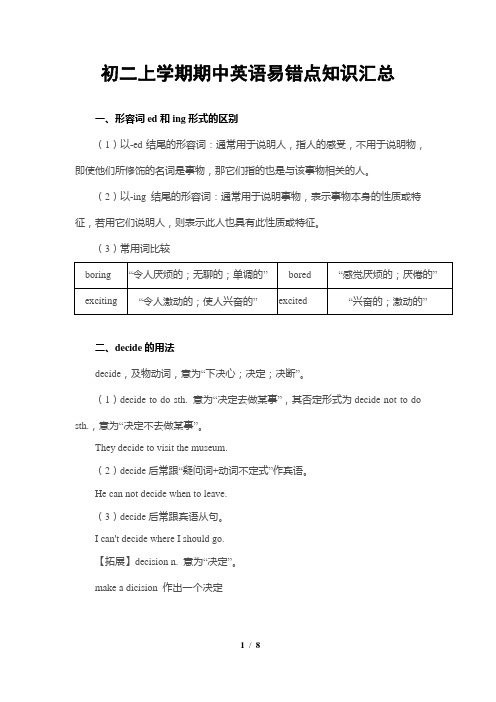
初二上学期期中英语易错点知识汇总二、decide的用法decide,及物动词,意为“下决心;决定;决断”。
(1)decide to do sth. 意为“决定去做某事”,其否定形式为decide not to do sth.,意为“决定不去做某事”。
They decide to visit the museum.(2)decide后常跟“疑问词+动词不定式”作宾语。
He can not decide when to leave.(3)decide后常跟宾语从句。
I can't decide where I should go.【拓展】decision n. 意为“决定”。
make a dicision 作出一个决定八、be good for/be good at/be good with十、It's+形容词+ for sb. to do sth.It's + 形容词+ for sb. to do sth.,意为“对某人来说做某事是...的”,其中,it 是形式主语,真正的主语是后面的动词不定式短语;句中的形容词往往是说明形容事物的,如important,necessary,difficult,easy,harddangerous,possible等。
如:It's necessary for us to get there on time.It's dangerous for a child to stay at home alone.【拓展】It's + 形容词+ of sb. to do sth.,意为“某人做某事是...的”,此时的形容词往往是说明形容人的性格特征品质的,如kind,nice,friendly,polite,clever,foolish,good,silly等。
如:It's kind of you to help me.It's very nice of you to lend an umbrella to me.十二、形容词、副词比较级的常用句型(1)A + be + 形容词比较级+ than + BA + 实义动词+ 副词比较级+than+B:A比B更/越···如:Jim is taller than Kate.I got up earlier than my mother this morning.(2)比较级+and+比较级/more and more + 比较级:越来越···如:He is getting taller and taller.Learning English is becoming more and more popular.【注意】单音节词及多数双音节词:比较级+and+比较级;部分双音节词和多音节词:more and more + 比较级(3)the+比较级,the+比较级:越···,就越···如:The more careful you are, the fewer mistakes you'll make.(4)Which/Who等疑问词+谓语+比较级,A or B?如:Who is taller, Tom or Jerry?Who draws better, Jenny or Danny?(5)“the + 形容词比较级+ of the two...”,意为“两者中较...的那个”,如:Look at the two boys. My brother is the taller of the two.十三、one of...one of...,意为“...之一”。
初中英语考后易错知识点

初中英语考后易错知识点初中英语考试是学生学习英语的一个重要评估工具,也是一个检验学生对英语知识掌握程度的重要途径。
在考试过程中,往往会出现一些易错的知识点,这些知识点如果不注意,就容易导致成绩出现偏差。
下面是初中英语考后易错知识点的总结。
1.词义辨析在英语试卷中,常常会出现一些词义辨析的题目,要求学生根据上下文的意思来选择正确的词义。
容易引起混淆的词义辨析有:a. travel/journey/trip/voyagetravel泛指旅行,旅游,常用作不可数名词;journey指较长距离的旅程,常用作可数名词;trip指较短时间的旅行,常用作可数名词;voyage指航海,常用作可数名词。
b. country/nation/state/kingdomcountry指国家,常用作不可数名词;nation指民族,常用作可数名词;state指国家,常用作不可数名词;kingdom指王国,常用作可数名词。
c. stay/live/visit/travelstay指暂时居住;live指长期居住;visit指访问,参观;travel 指旅行。
注意区分这些动词的用法。
2.时态的使用时态的使用是初中英语考试中常见的易错点,特别是对于一些细微的差异容易混淆。
以下是一些易错的时态使用:a.使用一般现在时表示将来b.使用一般过去时时态的一致性问题在描述过去的事件时,时态的一致性是重要的。
例如:Yesterday I go to school. 正确的表达方式是:Yesterday I went to school.c.使用现在进行时表示一种习惯或常态现在进行时主要用于表示现在的正在进行的动作,而不是一种习惯或常态。
例如:He is often going to the park. 正确的表达方式是:He often goes to the park.3.代词的使用代词在英语中起到代替名词的作用,是一种非常常见的语法现象。
- 1、下载文档前请自行甄别文档内容的完整性,平台不提供额外的编辑、内容补充、找答案等附加服务。
- 2、"仅部分预览"的文档,不可在线预览部分如存在完整性等问题,可反馈申请退款(可完整预览的文档不适用该条件!)。
- 3、如文档侵犯您的权益,请联系客服反馈,我们会尽快为您处理(人工客服工作时间:9:00-18:30)。
初二英语的知识点大全:易错词汇归纳初二英语知识点2017-11-151. clothes, cloth, clothingclothes统指各种衣服,谓语动词永远是复数,cloth指布,为不可数名词clothing 服装的总称,指一件衣服用a piece of, an article of2. incident, accidentincident指小事件, accident指不幸的事故He was killed in the accident.3. amount, numberamount后接不可数名词,number后接可数名词a number of students 4. family, house, homehome 家,包括住处和家人,house房子,住宅,family家庭成员. My family is a happy one.5. sound, voice, noisesound自然界各种各样的声音,voice人的嗓音,noise噪音I hate the loud noise outside.6. photo, picture, drawingphoto用照相机拍摄的照片,picture可指相片,图片,电影片,drawing 画的画Let's go and see a good picture.7. vocabulary, wordvocabulary词汇,一个人拥有的单词量,word具体的单词He has a large vocabulary.8. population, peoplepopulation人口,人数,people具体的人China has a large population.9. weather, climateweather一天内具体的天气状况,climate长期的气候状况The climate here is not good for you.10. road, street, path, wayroad具体的公路,马路,street街道,path小路,小径,way道路,途径take this road; in the street, show me the way to the museum.11. course, subjectcourse课程(可包括多门科目),subject科目(具体的学科)a summer course 12. custom, habitcustom传统风俗,习俗,也可指生活习惯,后接to do,habit生活习惯,习惯成自然,后接of doing. I've got the habit of drinking a lot.13. cause, reasoncause 指造成某一事实或现象的直接原因,后接of sth./doing sth,reason 用来解释某种现象或结果的理由,后接for sth./doing sth. the reason for being late14. exercise, exercises, practiceexercise运动,锻炼(不可数),exercises练习(可数),practice(反复做的)练习Practice makes perfect.15. class, lesson作"课"解时,两者可以替换.指课文用lesson. 指班级或全体学生用class. lesson 6; class 516. speech, talk, lecturespeech指在公共场所所做的经过准备的较正式的演说,talk日常生活中的一般的谈话,讲话,lecture学术性的演讲,讲课a series of lecture on…17. officer, officialofficer部队的军官,official政府官员an army officer18. work, job二者均指工作。
work不可数,job可数a good job19. couple, paircouple主要指人或动物,pair多指由两部分组成的东西a pair of trousers 20. country, nation, state, landcountry侧重指版图,疆域,nation指人民,国民,民族,state侧重指政府,政体,land国土,国家The whole nation was sad at the news.21. cook, cookercook厨师,cooker厨具He is a good cook.22. damage, damagesdamage不可数名词, 损害,损失; damages复数形式, 赔偿金$900 damages23. police, policemanpolice警察的总称,后接复数谓语动词,policeman 指某个具体的警察The police are questioning everyone in the house.24. problem, questionproblem常和困难连系,前面的动词常为think about, solve, raise,question常和疑问连系,多和ask, answer连用25. man, a manman人类,a man一个男人Man will conquer nature.26. chick, chicken二者均可指小鸡,chicken还可以当鸡肉The chicken is delicious.27. telegram, telegraph当电报解时,telegram指具体的,telegraph指抽象的 a telegram, by telegraph28. trip, journey, travel, voyagetravel是最常用的,trip指短期的旅途,journey指稍长的旅途,voyage指海上航行a three-day trip29. sport, gamesport多指户外的游戏或娱乐活动,如打球,游泳,打猎,赛马等;game指决定胜负的游戏,通常有一套规则His favorite sport is swimming.30. price, prizeprice价格,prize奖,奖品,奖金win the first prize The price is high/low.31. a number of, the number ofa number of许多,谓语动词用复数。
the number of…的数目,谓语动词用单数。
The number of students is increasing.32. in front of, in the front ofin front of范围外的前面,in the front of范围内的前面In the front of the room sits a boy.33. of the day, of a dayof the day每一天的,当时的,当代的,of a day暂时的,不长久的a famous scientist of the day34. three of us, the three of usthree of us我们(不止三个)中的三个,the three of us我们三个(就三个人)The three of us---Tom, Jack and I went to the cinema.35. by bus, on the busby bus表手段,方式,不用冠词,on the bus表范围They went there by bus.36. for a moment, for the momentfor a moment 片刻,一会儿,for the moment暂时,一时Thinking fora moment, he agreed.37. next year, the next yearnext year将来时间状语,the next year过去将来时间状语He said he would go abroad the next year.38. more than a year, more than one yearmore than a year一年多,more than one year超过一年(两年或三年等) 39. take advice, take the(one's) advicetake advice征求意见,take the advice接受忠告He refused to take the advice and failed again.40. take air, take the airtake air传播,走漏,take the air到户外去,散步We take the air every day.41. in a word, in wordsin a word总之,一句话,in words口头上In a word, you are right. 42. in place of, in the place ofin place of代替,in the place of在…地方A new building is built in the place of the old one.43. in secret, in the secretin secret秘密地,暗自地,偷偷地,一般用作状语;in the secret知道内情,知道秘密,一般用作表语My mother was in the secret from the beginning.44. a girl, one girla girl可泛指所有女孩, one girl一个女孩Can one girl carry such a big box?45. take a chair, take the chairtake a chair相当于sit down坐下,take the chair开始开会46. go to sea, by sea, by the seago to sea当海员,出航,by sea乘船,由海路,by the sea在海边go by sea47. the doctor and teacher, the doctor and the teacherthe doctor and teacher指一个人,既是医生又是老师,the doctor and the teacher两个人,一个医生和一个老师the doctor and teacher is48. in office, in the officein office在职的,in the office在办公室里He is in office, not out of office.49. in bed, on the bedin bed卧在床上,on the bed在床上The book is on the bed. He is ill in bed.50. in charge of, in the charge ofin charge of管理,负责照料,in the charge of由……照料He is in charge of the matter. The matter is in the charge of her.51. in class, in the classin class在课上,in the class在班级里He is the best student in the class.52. on fire, on the fireon fire着火,on the fire在火上Put the food on the fire. The house is on fire.53. out of question, out of the questionout of question毫无疑问的,out of the question不可能的54. a second, the seconda second又一,再一,the second第……He won the second prize.55. by day, by the dayby day白天,by the day按天计算The workers are paid by the day. 56. the people, a peoplethe people指人,a people指民族The Chinese is a peace-loving people.57. it, oneit同一物体,one同类不同一I lost my pen. I have to buy a new one.58. that, thisthat指代上文所提到的,this导出下文所要说的I was ill. That's why…59. none, nothing, no onenone强调有多少,nothing, no one强调有没有,nothing指物,no one 指人--- How many…/How much…? --- None.60. anyone, any oneanyone指人,不能接of,any one指人物均可,可接of any one of you 61. who, whatwho指姓名或关系,what指职业或地位What is your dad? He is a teacher.62. what, whichwhat的选择基础是无限制的,which在一定范围内进行选择Which do you prefer, bananas or apples?63. other, anotherother后接名词复数,another后接名词单数other students, another student64. not a little, not a bitnot a little非常,not a bit一点也不I'm not a bit tired. 我一点儿也不累。
